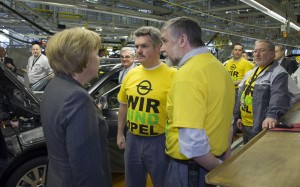
A GM or Opel failure means the lights go out all over Europe. Potentially, 300,000 jobs could go.
German Chancellor Angela Merkel met this evening at the Chancellery with German and U.S. government officials, representatives from General Motors Europe and Opel’s potential buyers. Bidders for the cash starved Opel brand include Fiat SpA, Canadian autoparts supplier Magna International Incorporated, U.S. financial firm Ripplewood Holdings LLC, and possibly Chinese carmaker Beijing Automotive Industry Corporation.
GM spokesperson Chris Preuss told TDB, “We’re hoping Merkel will be confident enough with the bids to give GM a bridge loan to help until we can negotiate the sale.”
GM desperately needs a €1.5 billion loan just to keep its European operations running during the next couple of weeks; and is attempting to sell off all or part of Opel to help its global restructuring. A GM bankruptcy is expected at any time now in the United States, and it is complicating its ability to save its overseas operations. About half of GM Europe’s 50,000 employees work at Opel in Germany. Vauxhall has 5,000 employees at two plants in England.
In order to facilitate the sale and help secure government loans, Opel’s supervisory board has approved a GM Europe plan to place its European plants, sales operations, patents and other assets, debt-free under German-based Adam Opel GmbH, Preuss said. GM’s Saab unit, currently in receivership in Sweden, is not part of this restructured, but cash short, Adam Opel.
There are “major questions” with all of the bids, German Economy Minister Karl-Theodor zu Guttenberg said today. And he would not rule out insolvency. In Europe, insolvency is similar to Chapter 7 of the U.S. Bankruptcy Code, which is not a restructuring of debt, like the one Chrysler is going through under Chapter 11, but simply a sale of assets and liquidation.
Senior GM officials have previously told TDB that a European insolvency is fraught with complexity and the risk of survival is exceptionally high.
GM’s negotiating position without government cash to keep Opel afloat is, obviously, weaker. GM would prefer to keep the race open so it can play the bidders off of one another.
Back in March, an Opel supervisory board plan irked European Union officials, who were openly dismissive and content to see Opel vanish. That survival plan was being discussed with individual European countries for €3.3 billion in loans to bridge what GM estimates will be a five-year period before car sales in Europe return to “normal levels.” However, individual country governments under pressure from their voters — including Germany, Belgium, the UK and Spain — are not of the same EU opinion and want to save jobs.
Back then GM said it will put in more than €3 billion in commitment, including a potential third party equity source that would sell off as much as 50% of GM’s stake in Opel.
GM and European politicians are facing the political nightmare of at least €1.2 billion Euros in structural cost reductions, which means job losses and plant closings that will take months upon months to negotiate in Europe’s fragmented political structure. Both Magna and Fiat have already confirmed that their plans for Opel include the loss of 10,000 jobs spread out over an unspecified period of time.
If GM Europe failed, not only would dozens of assembly and component plants be shuttered, but as many as 300,000 direct and indirect jobs — from assembly lines to dealer showrooms — would be lost.
Paul Eisenstein reported on this story
